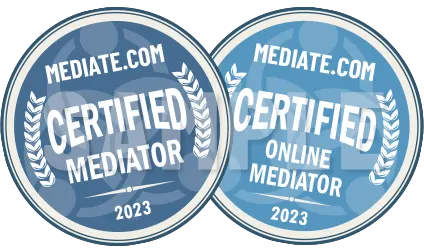
Core Values:
• Self-determination by the parties
• Impartiality of the mediator
• Disclosure of prior contacts and conflicts of interest
• Disclosure of training and experience
• Confidentiality of the mediation process
Guiding Principles for Certification Program:
• Easy to understand
• Accessible to broadest range of mediation practitioners
• Designed to support diversity of practice
• Transparent
• Voluntary
Definition of Mediation:
For purposes of certifying mediators, Mediate.com defines the mediation process as follows:
“Mediation” is a process in which a mediator (or more than one mediator) assists two or more parties to a controversy to reach a mutually acceptable resolution of the controversy. Mediation includes all contacts between a mediator and any party or agent of a party until such time as a resolution is agreed-upon or the mediation process is ended.”
Purpose of Mediate.com Certification Program:
The Mediate.com Certification Program is voluntary and establishes a standard of professionalism for mediators. Completion of the certification process will offer consumers an additional valuable criterion by which to gauge the qualifications of conflict management practitioners in the marketplace. While no professional certification is a warranty of competency, it remains a useful factor to be considered in choosing a mediator. Mediate.com certification includes individuals regardless of their profession of origin.
Training & Course Requirements:
An applicant for Mediate.com Certification must document the completion of at least 100 total hours of training or academic coursework in conflict resolution and mediation. Of these 100 hours, at least 80 hours must consist of training in mediation process skills, and at least 30 hours must be taken as part of a single comprehensive mediation process and skills training.
Mediation Experience:
The applicant must verify at least 100 total hours of mediation or active co-mediation experience within the last five (5) years, or 200 hours of mediation or active co-mediation over a lifetime of practice. Observation of mediation sessions does not constitute such mediation experience.
Disclosures:
Applicants must disclose criminal convictions and professional disciplinary actions. Mediate.com may refuse to certify an applicant who has been convicted of a criminal offense or been disciplined by a professional organization on ethical grounds, unless the applicant can demonstrate that the conviction or disciplinary matter is not relevant to professional and ethical issues associated with the practice of mediation. Failure to disclose complete and accurate information constitutes grounds for de-certification.
Topics to be included in the Mediator’s Training include:
• Communication Skills
• Conflict Theory
• Cultural Diversity
• Mediation Ethics
• History of Mediation
• Mediation Models, Strategies and Styles
• Negotiation
• Mediation Process Structure
• Roles of the Mediator
Examples of topics within each area include:
Communication: message construction, styles of communication; effective listening; supportive/defensive communication; effective feedback; effective questioning; identifying issues; non-verbal communication; perception; barriers to effective communication; stereotyping; reframing; clarifying; managing emotions; rapport development; learning styles; theories of communication; reason and emotion; empathy
Conflict Theory: distributive and integrative; constructive and destructive conflict (e.g., Deutsch); conflict and culture (e.g., Roth); escalation and de-escalation; theory and philosophy of conflict; social justice; religious/moral traditions; spectrum of conflict management processes
Cultural Diversity: meaning and use of language; negotiation rituals; use of interpreters; customs; understanding culture in varying contexts; assumptions and stereotyping; high context and low context cultures (e.g., Edward Hall); respecting, removing, or ignoring cultural barriers; the impact of cultural diversity on conflict situations and the mediation process; accessibility and accommodation; equity and diversity
Ethics: codes and standards of practice; informed consent; self-determination; conflicts of interest; unauthorized practice of other professions; confidentiality, competence; quality of process; advertising and marketing; fees; obligation to the field; diversity; duty to best interest of child; duty to report (to court or reporting abuse, fraud or criminal/violent behavior); when to withdraw
History of Mediation: community mediation; labor origins; Pound Conference; history of major organizations
Models, Strategies and Styles: principles; assumptions; values; commonalities; outcomes; transformative; law-based; facilitative; evaluative; business; advice and information; goals; cultural models; cyber; assessing risks and advantages of models; matching models to contexts and parties
Negotiation: theories; negotiation styles; tactics and strategies; interests and positions; BATNA, MLATNA, WATNA; positional bargaining; generating and testing options; brainstorming; stating issue; drafting agreements; power and power imbalances; caucus; use of experts; risk analysis; ground rules; creative thinking; problem-solving; issue formulation; visual displays; managing impasses
Process Structure: convening; gaining commitment to the process; information gathering; issue formulation; negotiation format; confirming understandings; caucuses; agreements to mediate; agenda-setting; termination of mediation; managing the presence of 3rd parties; process pacing and timing
Roles of the Mediator: neutrality; impartiality; mediation vs. other conflict resolution processes